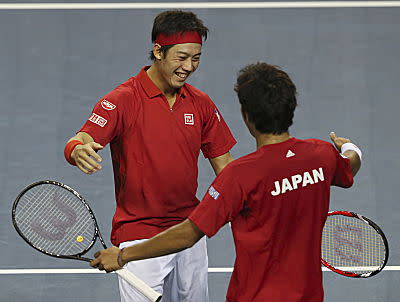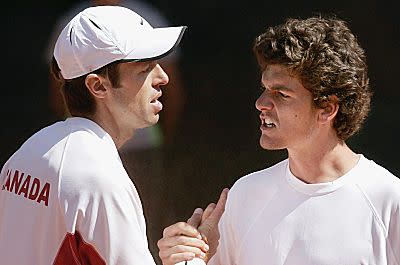Canada in deep Davis Cup trouble after dropping the doubles
The doubles rubber in this weekend’s Davis Cup tie against Japan was both a given, and a must-win for the Canadian team.
It was a given, because they had one of the best doubles players in history on their side of the net in Daniel Nestor.
It was a must-win in the wake of the absences of the team’s two top players, Milos Raonic and Vasek Pospisil, to take the doubles and try to win both singles matches against the Japanese No. 2 to get the three victories required to advance.
Now, after Nestor and Frank Dancevic were soundly and unexpectedly beaten 6-3, 7-6 (3), 4-6, 6-4 by the last-minute team of Kei Nishikori and 21-year-old Yasutaka Uchiyama, Canada is in a dire situation, down 2-1 with the reverse singles to be played Sunday.
“We’re in trouble. It’s been a tough challenge ever since we got here, losing our top two guys, down the first match. We’re just hanging on. But I’ve seen a lot of stuff happen,” captain Martin Laurendeau said in a post-match interview on Sportsnet.
The doubles lineup announced at a Davis Cup draw is typically a paper tiger; most often, the teams insert the names of the two players who aren’t playing singles on Friday, even if they’re really the substitutes. Having the top singles players added at the last minute is both allowed, and par for the course.
And so it was with Japanese No. 1 Kei Nishikori, who rarely plays doubles. But given the alternatives, it was a no-brainer – especially as he wasn’t pushed hard physically in his straight-sets win over Peter Polansky on Friday.
But what was unexpected was how well he played. And even more unexpected was some
brilliant play by his untested partner, who is ranked No. 280 in the world in singles and No. 215 in doubles.
The two came out on fire, easily taking the first set from a Canadian team that came out extremely flat.
Nestor and Dancevic have teamed up for Davis Cup doubles before, and hold a 3-0 record. But that’s ancient history. They were unfamiliar with each other, and it showed.
Still, the match was lost because of opportunities not converted.
The Canadians had a break point to secure a second break in the second set. And when they didn’t convert that, they suddenly found themselves in a tiebreaker, won by the Japanese.
After that, it was just a struggle. They didn’t capitalize on break opportunities, they didn’t put enough second serves in play, and the fleet-footed Japanese players were all over the net.
And just when they seemed to grab some momentum back after winning the set, they were immediately broken on Nestor's serve – with the help of two net cords that went the Japanese way.
The Japanese were the beneficiaries of every single lucky net-cord in the match – or at least, it seemed that way, probably half-a-dozen times.
"They were the better team from start to finish," Nestor said. "They deserved to win. They put a lot of pressure on us and caused us to make a lot of errors. They came out really playing well. We started to play better and got close in the second set but we never really caught up to them today."
The Canadians seemed to have particular trouble reading Nishikori’s serve; he was rarely troubled.
And when it came time for his young partner to serve out the match of his life, Uchiyama
pulled it off like a Grand Slam champion.
Nestor tried to make things happen at the net. But too often, he left his side far too early and the Japanese were patient enough to blast the ball into the open court.
Dancevic, who plays some doubles but not a lot, didn’t put returns in play and was vulnerable to the serves down the middle to his backhand, as well as volleys to his backhand as he played from the deuce court.
The Canadians really didn’t have any other options with the personnel available. But they had to expect a better result.
Ultimately, the Japanese players executed; the Canadians didn’t.
“Kei’s a great athlete, I thought he served better than I was expecting him to serve in doubles. He’s so quick at the net, gave our guys a lot of trouble,” Laurendeau toldl Sportsnet. “We were able to pin him with the down-the-line returns for a stretch, but it came down to who makes the break points, and they made a few more.”
The reverse singles on Sunday will be a huge challenge.
Dancevic, who at least got a look at Nishikori’s game up close during the doubles, will try to upset a player ranked 100 spots higher than him, and for good reason.
If he manages to do that, Peter Polansky will have an opportunity to clinch the tie with a win over Go Soeda.
But that’s a huge “if”.
In planning for the tie, the Canadians couldn’t realistically expect Dancevic to win over Nishikori; but they did plan to win the doubles.
But it’s Davis Cup; anything can happen, and often does.

 Yahoo Sports
Yahoo Sports 




